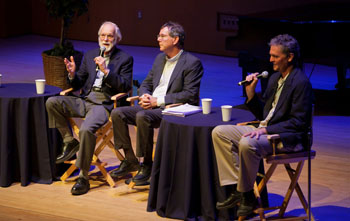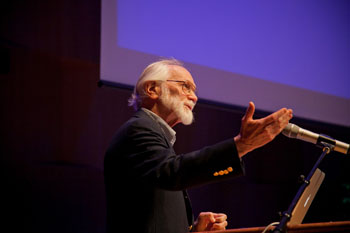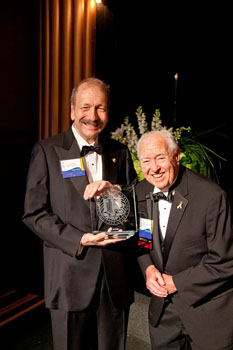Campus News
2011 UCSC Foundation Forum: on the front lines of the cancer war
The UCSC Foundation Forum, “At the Dawn of Personalized Medicine,” presented a rare, front-lines look at the future of personalized cancer diagnosis and treatment.





The UC Santa Cruz Foundation Forum, “At the Dawn of Personalized Medicine,” presented a rare, front-lines look at the future of personalized cancer diagnosis and treatment.
More than 200 guests listened to the discussion at the UCSC Music Recital Hall with J. Michael Bishop, University Professor and chancellor emeritus at UCSF; Arthur D. Levinson, chairman and former CEO of Genentech; David Haussler, distinguished professor of biomolecular engineering at UC Santa Cruz; and moderator Moira Gunn of Tech Nation.
Bishop is celebrated for his work on the genetic basis of cancer, which remains the focus of research in his lab at UCSF. In 1989, Bishop and Harold Varmus won the Nobel Prize for Physiology or Medicine for their research on cancer genes.
Sobering fact
Bishop began his presentation with a sobering fact: cancer remains “one of the most fearsome adversaries of humankind. One out of three people in this room will develop cancer, and one out of four will die of cancer.”
But Bishop also spoke with excitement about personalized cancer care, a major focus of current research efforts. In personalized care, doctors design targeted treatments based on the genetic changes found in a patient’s cancer cells.
Explaining the ways in which malfunctioning genes can cause cancer cells to multiply out of control, Bishop described oncogenes as acting like a jammed “accelerator,” while mutations in tumor-suppressor genes are like “defective brakes.”
Such malfunctions funnel into the genetic keyboard and cause disharmony, Bishop explained. “So we need to know every gene that is doing this, every gene that is malfunctioning. This is a huge enterprise, and it’s going to revolutionize (cancer treatment.)”
Cancer genomics
Cancer genomics will be used for early detection, personalized therapy, and diagnostics, Bishop said. “Now we’re in a position to create ‘magic bullets.’ … We can attack outlaw cells without necessarily harming innocent bystanders. We can inhibit jammed accelerators and restore the brakes.”
The next presenter, Levinson, who worked with Bishop and Varmus at UCSF as a postdoctoral researcher before joining Genentech in 1980, elaborated on some of the more “targeted approaches to cancer treatment.”
Levinson expressed his confidence that the scientific community will figure out a way to “solve cancer” by intercepting several cancer-causing proteins at once, “allowing us to stop the pathways of cancer and its resistance to treatment. If you blast at multiple points, you can suppress activity even of a rare resistant cell. I think it could happen in 10 to 15 years.”
Genentech’s successes in drug development include the cancer drugs Herceptin and Avastin, which are used in genetically targeted treatments.
While Levinson spoke with confidence about the fight against cancer, he said that much work remains to be done, and that one of the biggest remaining obstacles to progress could be economic, especially “in a time of declining resources for research and development and rising health care costs.”
Genetic abnormalities cataloged
Haussler is involved in efforts to catalog genetic abnormalities found in different types of cancers and find links between specific genetic changes and the ways that patients respond to different treatments.
“It’s time the digital age meets cancer head on, and we can do this with the technology we have,” Haussler said. “With the community’s help, we can bring bold, new information technology to the battle against cancer.”
UCSC is famous for its genomic database. In the summer of 2000, shortly after the announcement of the first sequenced human genome, the entire sequence was posted on the internet for the first time from UC Santa Cruz. The website attracts 17 million hits per month from hundreds of thousands of biomedical researchers. Now Haussler is working to build a database of cancer genomics.
While Bishop went into detail about personalized cancer treatment, he emphasized that the most effective way of controlling cancer is still prevention.
“Vaccines prevent smallpox and measles,” and while there’s no all-purpose vaccine that stops cancer, people can now avail themselves of vaccines against the hepatitis B virus, a leading risk factor for cancer. People can also stop smoking and be careful to avoid sunlight exposure.
Bishop and Levinson were honored by the UC Santa Cruz Foundation during the annual Founders Celebration. During last week’s 2011 Founders Celebration Dinner, they received the Foundation Medal, which recognizes individuals of exceptionally distinguished achievement whose work and contribution to society illustrate the ideals and vision of UC Santa Cruz. (Click here for a full list of this year’s Founders Celebration honorees.)